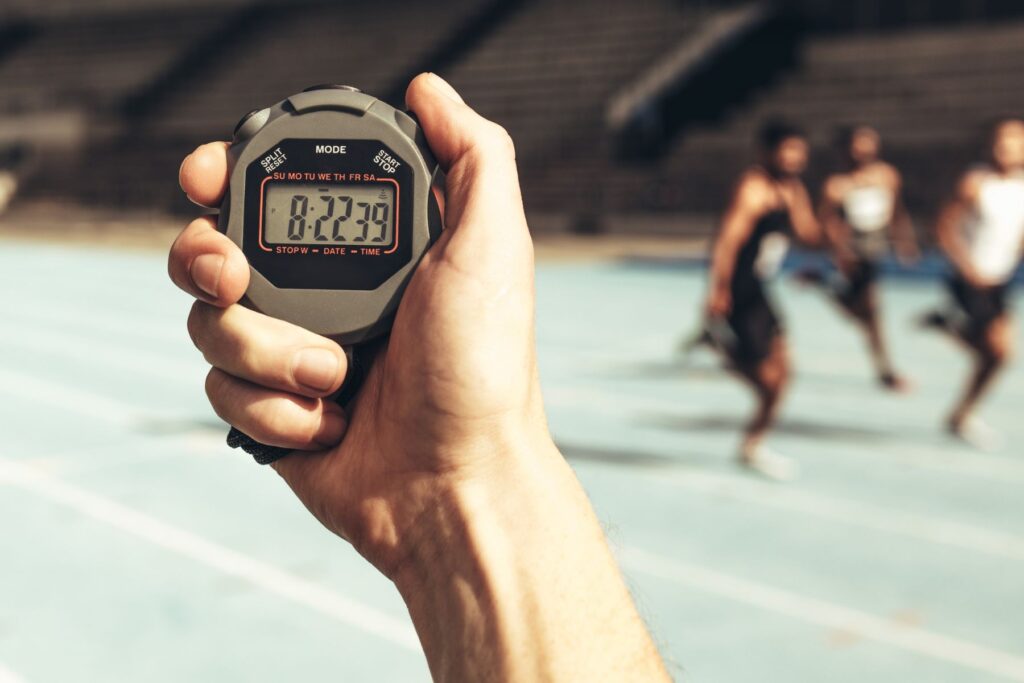Why Athletes Shouldn’t Focus on Weight
June 28, 2023

In the world of sport, weight tends to carry a LOT of weight in determining ability and performance. Some coaches, parents, and athletes use body weight as a metric of fitness. However, as we discussed in this blog post HERE, fitness doesn’t really have anything to do with body shape or size.
Why is weight such a focus in sport? Why should coaches, parents, and athletes stop focusing on it? In addition, what should we be focusing on instead? Let’s talk about it.
Body Image in Sport

For athletes, there can be a lot of pressure to achieve a specific body type for their sport. Often, media, peers, and mentors may promote the message that a smaller body that fits the mould equals better sports performance.
A competitive spirit is a favourable trait for an athlete. However, competitiveness can also be a downfall when it comes to body image and weight. It is not uncommon for athletes to compare their body to their peers’. They may strive to exercise the most, eat the least, or be the slimmest for the sake of performance.
Sometimes, athletes hold on to a specific image of their body from a time when they were very successful. This might have been a time where they were at their peak, hitting PRs, or were getting the most goals. Athletes may feel as though they need to eat and train the way they did at this time to achieve this same body and ultimately success whether or not these routines were healthy or enjoyable.
Overall, maintaining unsustainable practices to achieve a certain body is not a great idea. In the end, undereating and overtraining can lead to decreased performance. Not to mention, energy deficiency can also negatively impact health in the short and long term.
Why We Shouldn’t Focus on Weight in Sport

When athletes are not performing their best, athletes or mentors may jump to weight gain as the first offender. However, putting the focus on an athlete’s weight is often not the answer.
Instead, when approaching an athlete about their performance, consider the following:
-How are they sleeping?
-How are they eating?
-Are they taking the time to recover?
-Are they stressed about school or work?
-How is their mental health?
-Are there other outside factors that are impacting their life?
There are many other factors that can impact an athlete’s performance outside of their body shape.
Approaching an athlete about their performance with weight at the forefront has the potential to lead to disordered eating or other negative habits. When athletes are hyper fixated on these things it can be common for them to:
-Be tired
-Not sleep well
-Have slow recovery time
-Make technical mistakes
-Have mood changes
These signs can be important to monitor as they can indicate that an athlete is struggling. See our other post HERE for more on how coaches can monitor for and approach athletes with eating disorders.
Performance Metrics Other than Weight

So, if we aren’t focused on body size and shape, how can we measure performance? Well, there are SO many other ways to measure performance and fitness. In fact, these metrics are more useful and accurate than tracking an athlete’s weight.
Instead of stepping on the scale once a week (or more…) try measuring:
-Reaction time
-Speed
-Power
-Agility
-Flexibility
-Performance on easy days
-Increase in weight lifted
-Amount and quality of sleep
In Conclusion
Weight does not have to be the focus when it comes to sports performance. Focusing on body size often only leads to negative consequences that decrease sports performance in the end. There are so many other metrics that we can look at.
If you are trying to heal your relationship with food and/or exercise it is always a good idea to talk to someone you trust. Healthcare professionals that specialize in this area can also be beneficial including psychologists, dietitians, and more.
Looking for support today? See our dietitian services HERE.
If you enjoyed this topic, consider checking out our new podcast the “MInd Your Fitness Podcast” where we talk all about diet culture, body image, sport, and reclaiming the word “fitness”.